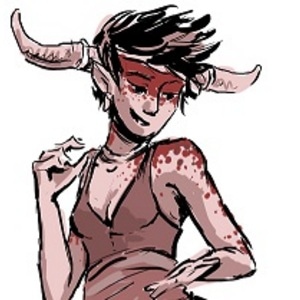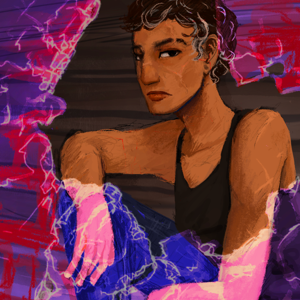Theo had worried Clarisse James would be difficult to read, but, thankfully, she was more expressive than she’d first seemed.
When he’d just graduated, before he’d started working or gotten custody, he’d gone out drinking occasionally with some childhood acquaintances. He preferred to spend free time with Linn or Abigail, but Linn usually stayed in, and Abigail wasn’t a very good drinking buddy. She tended to go home with someone an hour in and leave Theo alone at the bar.
Most of the boys Theo had grown up with went off to school in Ives. Many of them were as driven as Theo, and most had gotten exemplary grades. When their schooling ended, however, a good portion were cast adrift. Passed from childhood tutor to boarding school, they had never known a life that was not a series of structured challenges and rewards. A drink or two in, many would long to go back to a time with clear instructions and grades.
He’d heard it was worse in the military. Most of the soldiers in Saint’s Landing served locally, dealing with the defiled lands. They were able to work shifts and go home to sleep in their own beds, but he’d heard those that served at borders often had no idea how to adjust back to civilian life. If the official reports were correct, James probably had very few memories where she wasn’t working for the military or running from it.
Theo was experienced in telling disdain from discomfort as well. Linn had never been good with people, but she resorted to pretending she didn’t care. Clarisse seemed to feel safest hiding her discomfort behind structure and rules. He began to notice her awkward attempts to act casual, face subtly pinched in stress by even the offer of a pastry.
In her element, he started to see her relax. When praying for the corpse, she’d seemed gentle and sincere, but the greater her discomfort, the more she seemed to fall on formality.
She was uncomfortable now, walking through the Church District, the seat of the city’s elites. Her spine was ramrod straight, face blank, hands folded behind her.
“It’s the same bastards you’re used to,” Theo told her, “but they have a lot less power in Dalgerra. They’ve got money, but they’re equal in the law.”
Clarisse nodded silently, but he saw her relax a fraction. He’d heard horror stories of Avairne. How many nobles had she reported, only to watch the evidence quietly covered up by her superiors? How many false accusations and forced marriages had she been helpless against?
“The architecture is lovely,” Clarisse offered, attempting to loosen her posture and failing,
“We’re in the oldest part of Saint’s Landing. Most of the buildings are hundreds of years old, and anything new is required to build in the traditional style. Architects spend years trying to get a design approved.”
While most houses around here were built with local shiftwood, the houses in the Old Church District were all towering things of limestone. The original quarries had gone empty years ago, so all the building materials had to be carted in. Each one looked like it’s own temple, though most were private homes.
“It must be quite the achievement then, to say you’ve had a design approved here.”
“Yes. A lot of architects from other cities come to work on houses here.” Prestigious ones, of course. The only way to get permission to build here was to be commissioned by somebody who could afford to build here, and none of them took chances on upcoming talents.
“Do architects need licenses as well?”
“No, but their designs do need to be approved through city hall.”
James hummed in acknowledgement. She was still very stiff.
Well, if she was direct, perhaps it was best to be the same. Whatever her past, she needed to remember she was in Dalgera now.
“How did you handle it?” Theo asked her, “When nobles committed crimes, I mean? I’ve heard it’s almost impossible to prosecute a noble in Avairne. It must have made your job quite difficult.”
James nodded.
“It was, but there were ways to manage it. If a more important noble pushed the case, it became impossible to bury. If the crime was against a noble of higher status, I could pass evidence to them or their family to bring forward. If not, there were a few nobles willing to stand up for what was right, though none that could take every case without losing credibility.”
Theo whistled. She spoke of it casually, but, if James was telling the truth, she’d had close connections to multiple high ranking nobles. And what would that feel like, to choose which murderous nobles to accuse and which to let pass?
“You weren’t in trouble for passing on evidence to civilians?”
James actually laughed a bit, dead and dry as it was.
“Not at all. Who would deny a noble something they wanted? In fact, I was written up a few times for refusing to divulge information on cases to nobility.”
“And when there was no noble to back you up?”
James sighed. Seeing her like this, it was hard to believe she could be a spy. He could see the exhaustion in her face.
“In that case, all I could do was pass the evidence to whoever I could. Passing it to a parent would rarely lead to prosecution, but they sometimes seemed to keep their child in line, even if it was only to protect the family’s name. Passing it to a fiance, or the fiance’s family, could also be effective.”
“I’m glad I’ve never had to make such a choice,” Theo said. “The dead were lucky to have you on the case.”
“Thank you.”
She did seem to relax a bit, but he spotted the flash of annoyance in her eyes. Not distant annoyance at the nobility of Avairne, annoyance at him. Where had he slipped up? Was it simply his privilege to never face such a choice?
“You must worry what will happen now that you aren’t there.”
“It’s been three years, Mr. Dryden. I did my worrying, and it’s not as if I was the sole voice of reason in Avairne. I am simply thankful to be able to continue my work. It doesn’t matter where. The weight of a life doesn’t change across borders.”
In that moment, he truly doubted she could be a spy.
Maybe he just didn’t want her to be.
In anywhere but the Church District, the Handfellow estate would be grand, a towering building of white limestone. Here, it was almost modest, no gold leaf or rows of statues. Even inside, they seemed to favor minimalist decoration, showing their wealth with elegant construction rather than ornamentation.
The family gathered to meet in the living room, and Theo could immediately tell something was wrong.
When he was young, his perception got him in trouble. Things that seemed obvious to him weren’t obvious to others. He’d be confused why people called somebody happy when they were so clearly only pretending. He’d be scared of somebody, but totally unable to make anyone else understand why the way their eyebrows furrowed felt like a threat.
He’d struggled to learn to interpret them too. He’d see tension and assume a teacher was angry when they were actually stressed. It was harder with other cultures too. As a child, James would have terrified him simply because she had reactions he didn’t recognize.
He knew many of them now. Her pinkie twitched when she considered saluting. She closed her eyes after loud noises in an attempt to calm her nervous system from overstimulation. She fiddled with her earrings when she thought nobody was watching because she wasn’t used to them, while few Dalgerrans would be able to remember a time before them. Those were all habits he’d learned to recognize over the years.
Still, there were others he didn’t know. It would be a good chance to study Avairnian body language, as well as figure out James’ personal language. Why did she automatically keep her face hidden from crowdsm when most paranoid people watched them obsessively? Why did she touch her throat when she was reading?
The Handfellow family, in comparison, were open books. What specimens had Theo studied more thoroughly than the Saint’s Landing elite?
They were all grieving, certainly, but it was only the predominant emotion for the daughter. Flora was pink eyed and shaken, looking as if she was so deep in her grief each moment was intolerable. She clung to her fiance, who seemed to be totally focused on her with equally genuine concern. In this sort of neighborhood, couples didn’t show public affection before the marriage ceremony, but neither of them seemed in a state to care about that sort of thing.
Caspian’s parents, on the other hand, presented a much more complicated image. True grief, but controlled, proper grief. Black clothes, heads bowed, but no hitched breaths or pink eyes. That wasn’t what made him uncomfortable. It was a mistake, to dismiss somebody’s pain just because it was quiet. What was uncomfortable were the emotions paired with it.
Rage wasn’t a strange emotion either. Their son had been murdered, but they seemed… more irritated than vengeful. There was a tension in the way they watched Theo and James that reminded him more of suspects preparing for questioning than bereaved hoping for answers.
“Good morning,” he said, trying to match their dignified somberness, “my name is Theodore Dryden. I’ll be taking the lead on the case. I promise I will be doing everything in my power to bring your son justice.”
Thankfully, James kept silently in the doorway, watching the scene curiously.
“Thank you,” Mrs. Handfellow said, a crack in her voice finally betraying her grief. “Please catch whoever did this.”
“Is it alright if I ask a few questions? We’d like to learn a little more about Caspian.”
“Of course. We’re honored that somebody from the Dryden family would choose to look into our case.”
“You mentioned that Caspian was out at night quite a bit. Do you know who he was usually with?” Theo asked.
“He was a cheerful young man. Liked to go out drinking after work with some boys he grew up with,” Mr. Handfellow said. “Let’s see. Eric Aldercy, Basil Morris… I think the Montague boy. Henry?”
“Hugh,” Mrs. Handfellow offered. “They’d stay out late quite a bit, and he’d go to work in the morning so we just assumed we’d… missed him.”
There was something in there that seemed… no, he was being too suspicious. He wrote down the names. He recognized most of the family names, so they’d probably be able to track them down today.
“Is there anyone he’d had issues with?”
“Of course not! Caspian was a sweet, quiet boy. I can’t think of a single soul that hated him,” Mrs. Handfellow said.
“To your knowledge, was Caspian involved with anything illegal?”
“What a disgusting thing to ask,” Mr. Handfellow hissed. “Of course not! My son is the victim of a horrible crime, not a criminal!”
“I’m sorry, sir. These are standard questions. I mean no disrespect towards him.”
Theo felt a bit… off his game though. There was something he was missing, something itching at the back of his brain, yet he couldn’t pinpoint what.
“Well, he wasn’t!” Mrs. Handfellow told him.
“What about enemies of the family?”
“None that would go after Caspian. He asked for us to pass the business on to Flora a few years ago. He was quite taken with map making.”
Theo had planned the questions before coming, but couldn’t remember them well.. What was it he’d planned to say?
“Detective Dryden, may I ask something?” James said from the doorway.
“Go ahead.”
“Forgive me for being blunt, but I’d like to know why Mr. Handfellow is using influence casting on detectives.”
Even Flora’s sniffles stopped.
That was what he’d been missing; everything. He hadn’t been watching their expressions, hadn’t been digging into their answers, hadn’t been watching the reactions of people who weren’t speaking. He’d just felt… disinterested, and he’d trusted his gut. Theo wanted to slap himself. He’d tried to learn to recognize emotional influence. On paper, he knew to watch for feelings like this, when something about the situation just felt a bit wrong.
Now that he recognized it, he could push through it, take in their expressions properly.
“Don’t blame my husband for your emotions just because you’re unstable,” Mrs. Handfellow hissed.
“I’m afraid there’s a misunderstanding. Caster James has recently joined my team as a tracer. I believe her comment was based on magical signature, not supposition.”
“Well, then you’ve added a poor tracer to your team. I’d like her to leave,” Mrs. Handfellow said. Mr. Handfellow was still clearly in concentration on the cast, as a sudden shift in emotion right after the accusation would only make them look more guilty.
“Sir? Should I step outside?”
“I believe we both should. This clearly will not be a productive meeting.”
It was good none of them could see what he could, because then they’d know he was lying.
This meeting had been incredibly informative.











Comments (1)
See all